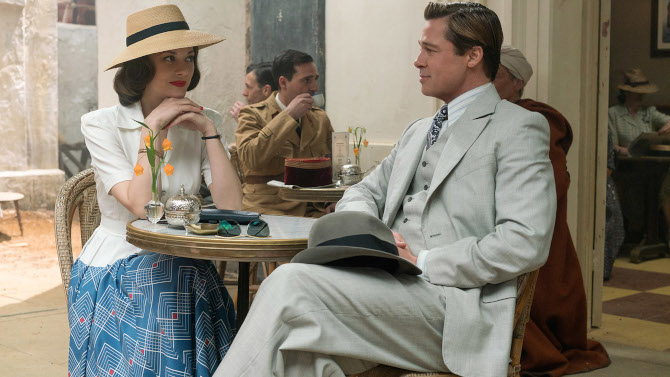
Déjà vu Dalliance
Channeling the mesmeric movies churned out by the studio system back in the 1930s and 40s, Allied (2016), directed by Robert Zemeckis, channels the likes of Morocco, Casablanca, Across the Pacific, Gilda, To Have and Have Not, and numerous others – attempting to find a spark from the classic themes of melodrama, romance, suspense and the epic nature of the annals of the cinematic past, with quite successful results. Set the year Casablanca and Across the Pacific were released – 1942, the story in fact starts in Morocco, with recently parachuted in Canadian spy Max Vatan (Brad Pitt) meeting up with another undercover agent, Marianne Beauséjour (Marion Cotillard), who will be pretending to be his wife.
-
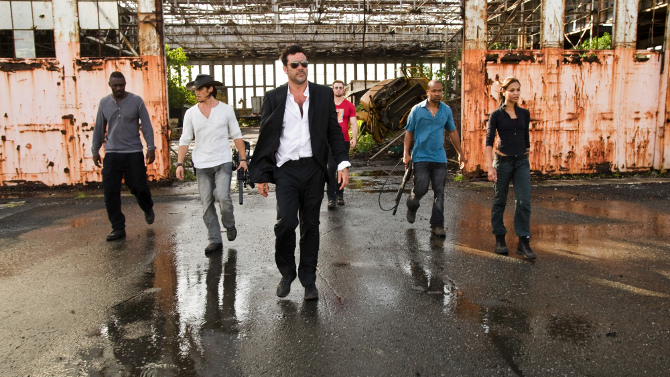
Don’t Stop Believing
The LosersMay 8, 2020It is likely that, if you were able to transplant The Losers release date from 2010 to 2020, the film would be a major hit (sadly, in 2010 it was not). A comic book movie that perfectly combines high octane action with liberal doses of comedy, it starred Jeffrey Dean Morgan (a superb character actor both before and after this film – including memorable stints on television series like Supernatural and The Walking Dead, as well as films like Watchmen and Rampage), Chris Evans (just one year before he really took off with his role as Captain America), Idris Elba (just as he was exploding on the scene with his excellent BBC series Luther – he would also make his Marvel debut the next year as Heimdall in the Thor films), and Zoe Saldana (a year after her breakthrough role in Avatar, she has exploded into superstardom by playing Uhura in the Star Trek franchise and Gamora in the Guardians of the Galaxy Marvel movies), it would be damn near impossible to unite a cast like this again without a hundred million dollar plus budget (for your information, this film had a twenty-five million dollar budget). Following a CIA special forces unit, their leader is Lieutenant Colonel Franklin Clay (Morgan) – a man who looks like a 60s sex symbol (bespoke suit, no tie, three buttons undone, chest hair flowing); his best friend, explosives expert Captain William Rogue (Elba) – who is an aptly named moody wildcard; intelligence expert and computer whiz Captain Jake Jensen (Evans) – a constant kidder who thinks he is cooler than he actually is; their eyes and ears, Sergeant Linwood “Pooch” Porteous (Columbus Short); and sniper Sergeant Carlos “Cougar” Alvarez (Óscar Jaenada) – the strong and silent type.
-
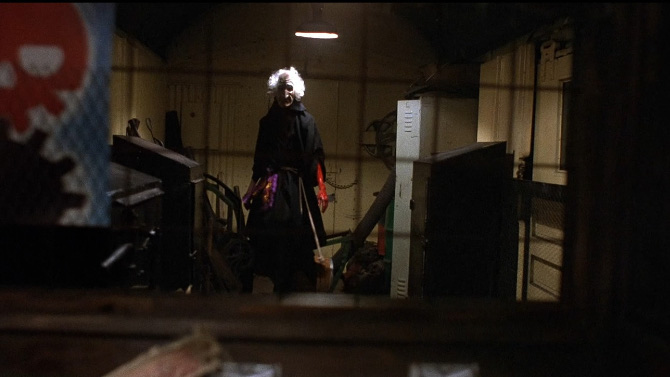
Train Crossing
Terror TrainApril 24, 2020‘Capitalize’ is the word of the day – and boy was it well conceived. Meaning both ‘to take a chance to gain advantage’ as well as ‘to provide with money’, both definitions speak to today’s motion picture. . . for Terror Train (1980) arrived in theatres just two short years after the seminal slasher movie Halloween (right in the heart of the horror boom), taking a somewhat similar premise to the aforementioned movie while also bringing that film’s star, Jamie Lee Curtis, along for the bumpy ride (talk about trying to ‘capitalize’ on the present cinematic situation. . . and, in the end, they basically doubled its limited 4.2 million dollar budget). A Canadian production (in many ways, Canadians were experts at developing these slasher flicks – think of arguably the first of the sub-genre – Black Christmas, as well as Prom Night, My Bloody Valentine, Happy Birthday to Me. . .), recently I reviewed the big budget 1998 James Bond film Tomorrow Never Dies, directed by Roger Spottiswoode. . . what was he doing eighteen years prior? Directing this low budget horror film (his first ever directorial effort).
-
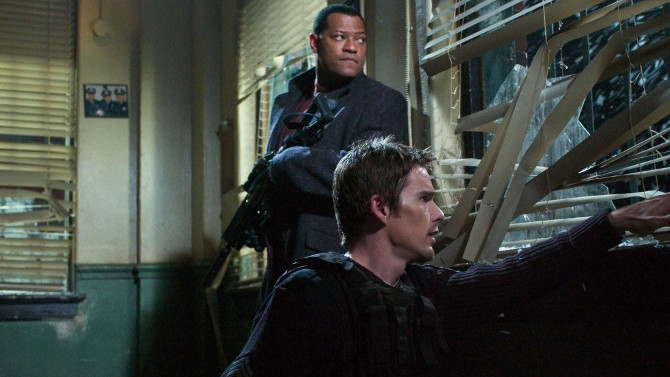
Aggravated Assault
Assault on Precinct 13April 19, 2020A remake, especially of a classic (or cult classic) is tricky. You’ll have a tough time winning over the purists – too similar and it is considered a cheap rehash. . . too different and it is looked upon as not paying proper tribute to the original, meaning that you’ve really got a lose/lose situation (in regards to your core audience). One remake that deserves a second look is the 2005 Jean-François Richet (Mesrine Part 1 & 2; Blood Father) action crime film Assault on Precinct 13. Based upon the John Carpenter film of the same name (the filmmaker carrying with him a group of diehard fans that are hard to please), James DeMonaco (the scribe of The Purge franchise) takes over the gargantuan task of modernizing this iconic cult classic. Rooted in a very similar situation (but changing enough to make it feel quite fresh), as in its predecessor, the Precinct is closing in one short day – in this case, on January 1st.
-
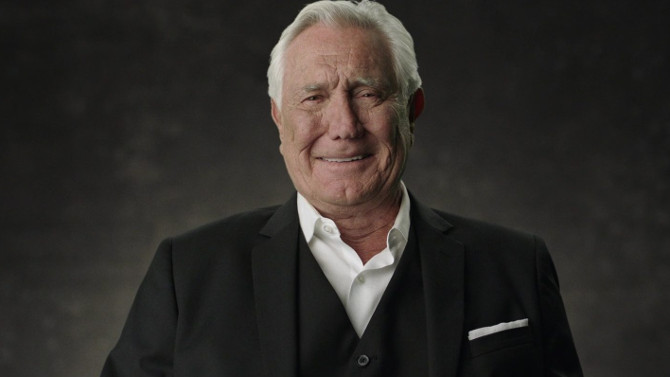
Shaken and Stirred
Becoming BondApril 17, 2020When it comes to On Her Majesty’s Secret Service, there may not be another James Bond film that is more divisive amongst fans. Tending to have people falling on either the love it or hate it side. . . there are good arguments to be made in both camps – yet that is not something to be settled here today. No matter where you fall within this conversation, if you’re a Bond fan, the 2017 documentary Becoming Bond, written, directed and produced by Josh Greenbaum, is for you. As playful as any Bond film (and perhaps as implausible), George Lazenby (star of On Her Majesty’s Secret Service – and the only actor to play 007 just once) narrates us through his fascinating life (including when Sean Connery decided to step away from the character. . . only to return once more after Lazenby decided not to put his John Hancock onto a seven film deal that included a one million dollar signing bonus – preferring freedom and a life over fame and fortune).
-
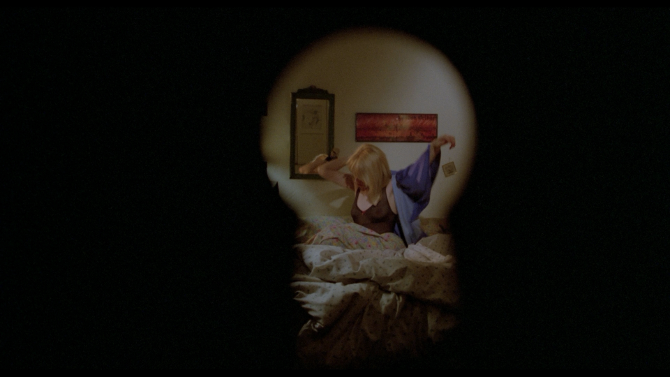
What’s In a Name?
OliviaMarch 29, 2020Are you in the mood for a Taste of Sin. . . perhaps with a dash of Double Jeopardy. . . and what the heck even is a Prozzie (for those of you not in the know, it is slang for a prostitute). . . or, to end with the most generic and lackluster of all, meet Olivia. Every once in a while, you’ve just got to love finding a little known, underground, low budget B movie that has stayed hidden from most of the world since its release (in this case, 1983), and Olivia (which was also released under the three other titles mentioned above) fits the bill. A film that pulls a bit from Alfred Hitchcock’s Vertigo (you might also recognize some similarities to Marnie and Psycho), as well as from the luridly entertaining crime and thrillers coming out of Europe the decade previously (gialli and poliziotteschi), and a number of other sources, co-writer/director Ulli Lommel (who was a frequent collaborator with acclaimed Rainer Werner Fassbinder), introduces us to poor Olivia (Suzanna Love as an adult; as a five year old – Amy Robinson), a young woman who has been dealt a poor hand in life. Growing up with her prostitute mother overlooking London bridge, she witnesses her mom’s demise at the hands of a sadistic American soldier (Nicholas Love). . . flash forward fifteen years, and she has found her way into the arms of the first brute she bumps into, Richard (Jeff Winchester) – already four years married to the uncouth, violent factory worker.
-
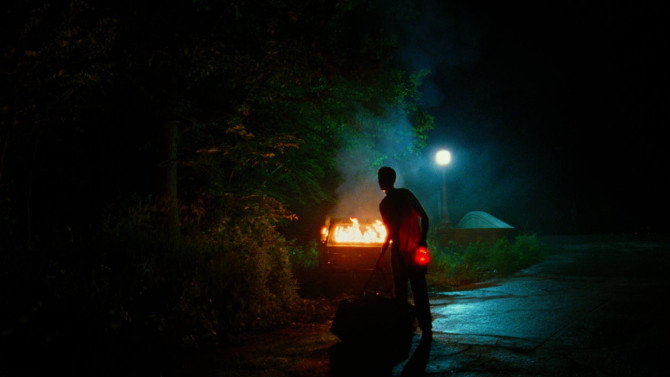
Going Under
Lost RiverMarch 27, 2020Ryan Gosling’s first, and to date, only writing and directing credit, 2014's Lost River is by no means a film for everyone. . . an arthouse style dark fairytale with tinges of gialli violence and colour, the actor turned filmmaker sets in place a slow, unsettling mood that will either hold you in its oppressive grip, or might just leave you up the creek without a paddle. The title a reference to the town in which we are dropped into, it is like much of smaller town America (and some of larger city America as well – it is actually filmed in Detroit), a crumbling locale where many young folks have fled, businesses sit empty, roving gangs of hoodlums burn houses for the fun of it, and everyone lives in a dystopic-like fugue state of depressed apathy.
